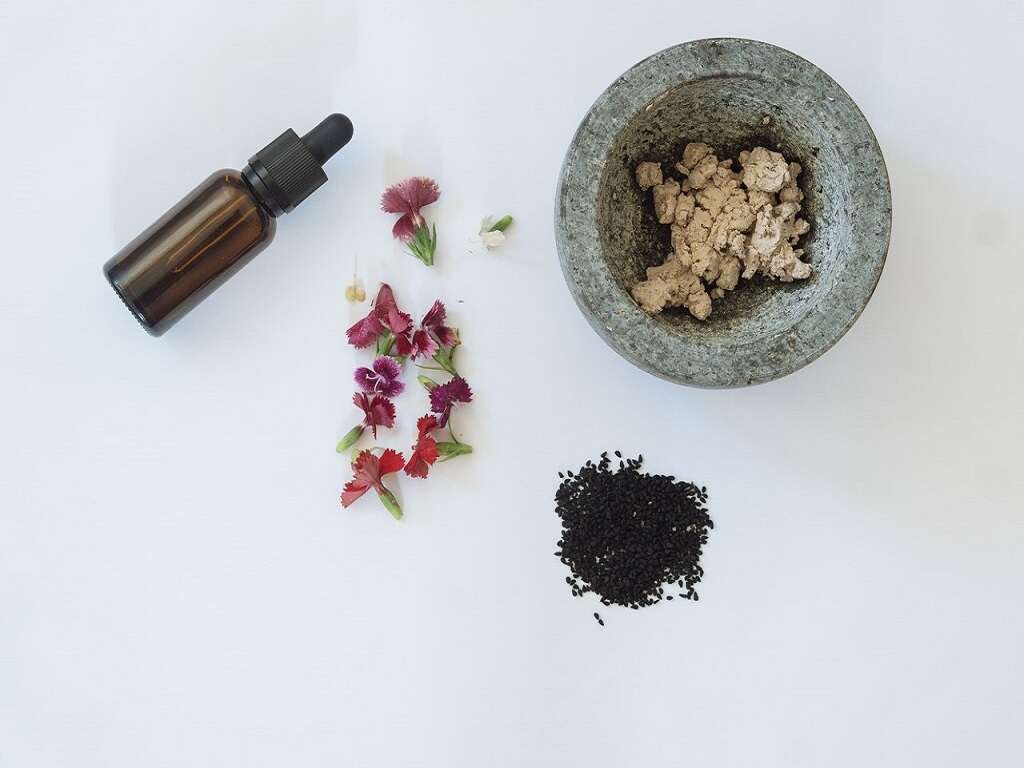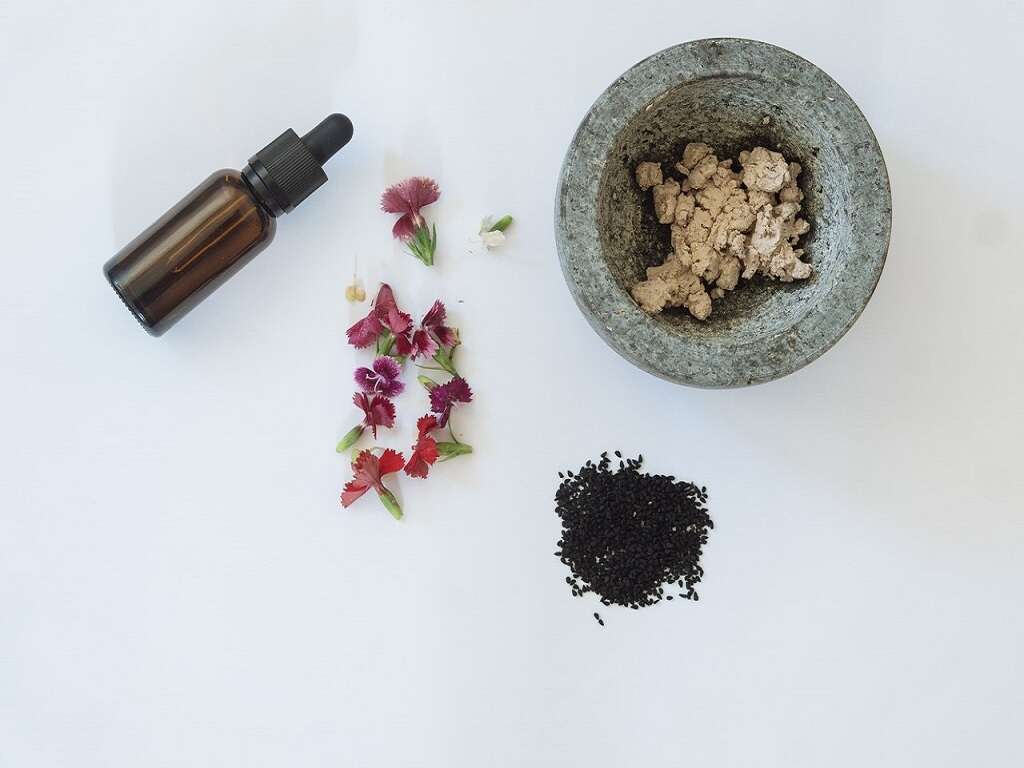10 Benefits of Black Seed Oil
 Article Sources
Article Sources
- 1. 'A Review on Therapeutic Potential of Nigella Sativa: A Miracle Herb.' PubMed, pubmed.ncbi.nlm.nih.gov/29962349.
- 2. H;, Tavakkoli A;Mahdian V;Razavi BM;Hosseinzadeh. 'Review on Clinical Trials of Black Seed (Nigella Sativa ) and Its Active Constituent, Thymoquinone.' Journal of Pharmacopuncture, U.S. National Library of Medicine, pubmed.ncbi.nlm.nih.gov/30087794
- 3. Yimer, Ebrahim M., et al. 'Nigella Sativa L. (Black Cumin): A Promising Natural Remedy for Wide Range of Illnesses.' Evidence-Based Complementary and Alternative Medicine, Hindawi, 12 May 2019, www.hindawi.com/journals/ecam/2019/1528635
- 4. 'Anticancer Activities of Nigella Sativa (Black Cumin).' PubMed, pubmed.ncbi.nlm.nih.gov/22754079
- 5. 'The Anti-Inflammatory Activity of Nigella Sativa Balm Sticks.' core.ac.uk/reader/291483543
- 6. Beheshti F;Norouzi F;Abareshi A;Khazaei M;Alikhani V;Moussavi S;Biglari G;Soukhtanloo M;Hosseini M; 'Nigella Sativa Prevented Liver and Renal Tissue Damage in Lipopolysaccharide-Treated Rats.' Saudi Journal of Kidney Diseases and Transplantation : an Official Publication of the Saudi Center for Organ Transplantation, Saudi Arabia, U.S. National Library of Medicine, pubmed.ncbi.nlm.nih.gov/29970731
- 7. H Shokri. 'A Review on the Inhibitory Potential of Nigella Sativa against Pathogenic and Toxigenic Fungi.' Avicenna Journal of Phytomedicine, U.S. National Library of Medicine, pubmed.ncbi.nlm.nih.gov/27247919
Black seed oil is extracted from the seeds of an annual flowering plant called Nigella sativa. The plant, also known as black cumin, grows naturally in Africa, the Mediterranean and southwest Asia. Nigella sativa is an Ayurvedic herb that has been used in traditional medicines for over 2,000 years.
Folk remedies featuring black seed oil are used for skin infections, respiratory issues, weight loss and even cancer. Bioactive compounds in black seed oil are responsible for its pharmacological effects. Thymoquinone, or TQ, is the most well-understood component, but research is ongoing to analyze the benefits of other compounds in the plant.

Antibacterial Properties
Thymoquinone, or TQ, may help inhibit the growth of many gram-positive and gram-negative bacteria, including E. coli.1‘A Review on Therapeutic Potential of Nigella Sativa: A Miracle Herb.’ PubMed, pubmed.ncbi.nlm.nih.gov/29962349. Methicillin-resistant S. aureus seems to be sensitive to black seed oil extract. Several other types of antibiotic-resistant microbes are also sensitive to N. sativa extracts. A combination of antimicrobial and anti-inflammatory properties could make black seed oil useful for acne management.
Black seed oil extracts combined with antacids are effective against H. pylori, the bacteria that causes stomach ulcers and contributes to some types of gastric cancer, according to a clinical trial. TQ's bactericidal properties can also disrupt bacteria that form biofilms, such as Listeria monocytogenes.2H;, Tavakkoli A;Mahdian V;Razavi BM;Hosseinzadeh. ‘Review on Clinical Trials of Black Seed (Nigella Sativa ) and Its Active Constituent, Thymoquinone.’ Journal of Pharmacopuncture, U.S. National Library of Medicine, pubmed.ncbi.nlm.nih.gov/30087794

Antidiabetic Effects
Elevated blood glucose associated with diabetes can cause cellular damage that contributes to complications. Black seed oil may reduce fasting blood sugar and HbA1c levels and increase insulin production. Thymoquinone is a powerful antioxidant and may protect the pancreatic islets and beta cells responsible for insulin production.1‘A Review on Therapeutic Potential of Nigella Sativa: A Miracle Herb.’ PubMed, pubmed.ncbi.nlm.nih.gov/29962349.
Some evidence suggests that black seed oil can also enhance certain enzymes necessary for carbohydrate metabolism and influence serum insulin levels by reducing insulin absorption in the intestines.2H;, Tavakkoli A;Mahdian V;Razavi BM;Hosseinzadeh. ‘Review on Clinical Trials of Black Seed (Nigella Sativa ) and Its Active Constituent, Thymoquinone.’ Journal of Pharmacopuncture, U.S. National Library of Medicine, pubmed.ncbi.nlm.nih.gov/30087794

Neuroprotective Benefits
Many neurological disorders, including depression and anxiety, are related to neurotransmitter imbalance. Stress is a common trigger for altered neurochemicals and behavioral changes. Stressed mice given black seed oil developed increased levels of two neurotransmitters, GABA and serotonin.2H;, Tavakkoli A;Mahdian V;Razavi BM;Hosseinzadeh. ‘Review on Clinical Trials of Black Seed (Nigella Sativa ) and Its Active Constituent, Thymoquinone.’ Journal of Pharmacopuncture, U.S. National Library of Medicine, pubmed.ncbi.nlm.nih.gov/30087794
Research suggests that nigella sativa extracts may even help reduce epileptic seizure frequency, and flavonoids in black seed oil may regulate neuronal signaling paths, which are essential in processing memory. Thymoquinone positively influences dopamine production and may prevent loss of neurons in Parkinson's disease.1‘A Review on Therapeutic Potential of Nigella Sativa: A Miracle Herb.’ PubMed, pubmed.ncbi.nlm.nih.gov/29962349.

Antifungal Remedies
Black seed oil has a long history as a folk remedy for fungal skin infections. Methanolic compounds, oleic acid and TQ are all bioactive compounds in black seed oil with strong antifungal effects, especially against a common fungus called Candida albicans.1‘A Review on Therapeutic Potential of Nigella Sativa: A Miracle Herb.’ PubMed, pubmed.ncbi.nlm.nih.gov/29962349.
Several types of yeast and potentially pathogenic fungus species, known as dermatophytes, are sensitive to black seed oil. Dermatophytic fungi species can invade keratinized tissues, which includes human skin and nails.7H Shokri. ‘A Review on the Inhibitory Potential of Nigella Sativa against Pathogenic and Toxigenic Fungi.’ Avicenna Journal of Phytomedicine, U.S. National Library of Medicine, pubmed.ncbi.nlm.nih.gov/27247919

Antiviral Treatment
Black seed oil may help suppress viral loads. One study analyzed the effects of black seed oil among people with hepatitis C. Improvements in total protein, platelet and red blood cell counts were noted. Most participants experienced drastic viral load reduction, and approximately 16 percent became seronegative, meaning the virus couldn't be detected.3Yimer, Ebrahim M., et al. ‘Nigella Sativa L. (Black Cumin): A Promising Natural Remedy for Wide Range of Illnesses.’ Evidence-Based Complementary and Alternative Medicine, Hindawi, 12 May 2019, www.hindawi.com/journals/ecam/2019/1528635
Two cases of HIV infection were also studied. Both people took black seed oil three times daily for one year. Viral loads decreased steadily, and one person became briefly seronegative.3Yimer, Ebrahim M., et al. ‘Nigella Sativa L. (Black Cumin): A Promising Natural Remedy for Wide Range of Illnesses.’ Evidence-Based Complementary and Alternative Medicine, Hindawi, 12 May 2019, www.hindawi.com/journals/ecam/2019/1528635

Kidney and Liver Function
People managing acute or chronic illnesses are often monitored for decreased kidney function. For example, gentamicin is a powerful antibiotic known for nephrotoxicity. Black seed oil may protect kidneys from gentamycin toxicity. 6Beheshti F;Norouzi F;Abareshi A;Khazaei M;Alikhani V;Moussavi S;Biglari G;Soukhtanloo M;Hosseini M; ‘Nigella Sativa Prevented Liver and Renal Tissue Damage in Lipopolysaccharide-Treated Rats.’ Saudi Journal of Kidney Diseases and Transplantation : an Official Publication of the Saudi Center for Organ Transplantation, Saudi Arabia, U.S. National Library of Medicine, pubmed.ncbi.nlm.nih.gov/29970731
Levels of nitrates, bilirubin and thiobarbituric acid help assess the liver function, while BUN and creatinine levels are indicators of kidney function. Experiments on rats found decreased levels of these substances after administering high doses of black seed oil. 6Beheshti F;Norouzi F;Abareshi A;Khazaei M;Alikhani V;Moussavi S;Biglari G;Soukhtanloo M;Hosseini M; ‘Nigella Sativa Prevented Liver and Renal Tissue Damage in Lipopolysaccharide-Treated Rats.’ Saudi Journal of Kidney Diseases and Transplantation : an Official Publication of the Saudi Center for Organ Transplantation, Saudi Arabia, U.S. National Library of Medicine, pubmed.ncbi.nlm.nih.gov/29970731

Blood Pressure and Obesity
Black seed oil has several cardiovascular benefits. It contains methanolic extracts that decrease triglyceride and LDL levels in blood plasma while increasing HDL levels. Nigella sativa has a mild diuretic effect and may act as a calcium channel blocker that may lower blood pressure.2H;, Tavakkoli A;Mahdian V;Razavi BM;Hosseinzadeh. ‘Review on Clinical Trials of Black Seed (Nigella Sativa ) and Its Active Constituent, Thymoquinone.’ Journal of Pharmacopuncture, U.S. National Library of Medicine, pubmed.ncbi.nlm.nih.gov/30087794
The unsaturated fatty acids in black seed oil, including linoleic acid, oleic acid and dihomolinoleic acid, may reduce the risk of cardiovascular disease. Combining black seed oil with a low-calorie diet may also help with weight loss. 2H;, Tavakkoli A;Mahdian V;Razavi BM;Hosseinzadeh. ‘Review on Clinical Trials of Black Seed (Nigella Sativa ) and Its Active Constituent, Thymoquinone.’ Journal of Pharmacopuncture, U.S. National Library of Medicine, pubmed.ncbi.nlm.nih.gov/30087794

Pain Relief
Black seed oil has anti-inflammatory and analgesic properties. TQ and other bioactive compounds in nigella sativa can inhibit certain inflammatory cells called cytokines and reduce inflammation.1‘A Review on Therapeutic Potential of Nigella Sativa: A Miracle Herb.’ PubMed, pubmed.ncbi.nlm.nih.gov/29962349.
Researchers in Indonesia looked at the topical effects of black seed oil as a balm. Balm sticks reduced acute inflammation, fluid build-up and drainage at the site of injury. The balm also relieved pain and achieved results comparable to topical application of hydrocortisone creams and ointments.5‘The Anti-Inflammatory Activity of Nigella Sativa Balm Sticks.’ core.ac.uk/reader/291483543

Allergy Relief
Black seed oil is sometimes used for allergy symptoms, such sneezing, congestion, itching and watery eyes. One study found that the effects of N. sativa extracts were comparable to common allergy medications, and the plant extract was actually more effective for relieving nighttime symptoms.2H;, Tavakkoli A;Mahdian V;Razavi BM;Hosseinzadeh. ‘Review on Clinical Trials of Black Seed (Nigella Sativa ) and Its Active Constituent, Thymoquinone.’ Journal of Pharmacopuncture, U.S. National Library of Medicine, pubmed.ncbi.nlm.nih.gov/30087794
Nigella sativa nasal drops also enhanced allergen tolerance for people receiving immunotherapy. Geriatric participants noted relief of symptoms, including nasal dryness, obstructed breathing and crusting over the eyes.2H;, Tavakkoli A;Mahdian V;Razavi BM;Hosseinzadeh. ‘Review on Clinical Trials of Black Seed (Nigella Sativa ) and Its Active Constituent, Thymoquinone.’ Journal of Pharmacopuncture, U.S. National Library of Medicine, pubmed.ncbi.nlm.nih.gov/30087794

Anticancer Effects
The anticancer effects of black seed oil are promising, but they're not fully researched or understood, yet.3Yimer, Ebrahim M., et al. ‘Nigella Sativa L. (Black Cumin): A Promising Natural Remedy for Wide Range of Illnesses.’ Evidence-Based Complementary and Alternative Medicine, Hindawi, 12 May 2019, www.hindawi.com/journals/ecam/2019/1528635 It may protect liver cells from chemical carcinogens that contribute to hepatic cancers. A study in 2009 noted that N. sativa extracts induced death in pancreatic cancer cells and slowed the spread of cancerous cells overall.4‘Anticancer Activities of Nigella Sativa (Black Cumin).’ PubMed, pubmed.ncbi.nlm.nih.gov/22754079
More research is needed to evaluate the possible health benefits of black seed oil. Like other natural supplements, black seed oil hasn't been evaluated by the FDA to treat diseases.











